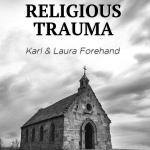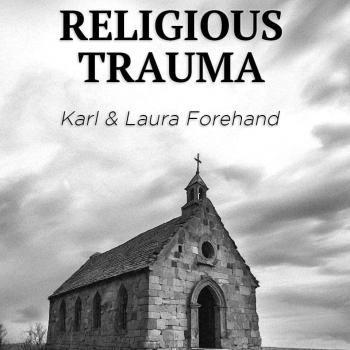A Plan for Us
(From our new book, Evolving From Religious Trauma. June 4th)
Listen to this blog – AI-Generated
Karl
As a former pastor, I remember the faces of people visiting for the first time. They were always more attentive than the other members. They were more hesitant to be demonstrative, but they looked hopeful in a cautious way. This always made me optimistic that they would be a new addition to the fold. They would be the right mix of maturity and hopeful optimism needed at this place. I did not want to look at them as prospects, but that was what I did. Most of the energy, especially in small churches, is about surviving, and that means that we always need new members.
Eventually, the newness would wear off, the individual or family would gain the courage to speak to us honestly, and they would reveal their woundedness. Oddly enough, it was usually from another church or a family situation that did not go well. Sometimes, the trauma happens internally as a teenager or young adult. As an adult, they would gain the courage to ask tough questions and reveal their struggles and hurts. This made us uncomfortable, but we knew they would not see a professional counselor or therapist. So, we did our best to try to help them.
Because we were uncomfortable and we knew they were desperate, we did what religious people often do. We bypassed the significant issues with quick, religious-sounding fixes that did not address the root problems. In our hearts, we knew we were not solving anything, but we hoped God would do something miraculous eventually. We told them we would pray for them, we cared about them, and we understood. But often, we told them something a little too familiar—that God had a purpose and a plan for their lives.
Jeremiah 29:11 was where God promised Israel (broadly) that he had plans for them while they were in captivity. According to the Bible, the Babylonians released them from their bondage; but the passage is not addressed to anyone else, even though the multitudes have used and abused it to imagine God having a specific plan and purpose for each of us. It gives us temporary comfort, but I now understand it to have some negative repercussions.
If I told one of my children, “I have a plan for you,” their first question would be, “What is it?” But therein lies the problem. As a pastor for 20 years, the most common issue is that the congregation is still searching for this illusive plan and purpose. They believe they have one (because God gave it to them), so they go to conferences and read books and listen intently every Sunday, hoping they will uncover the details of this plan and purpose. This lostness keeps them in perpetual shame and makes them vulnerable.
Eventually, church members become swept up in the purpose and plan of the pastor and church organization. Subtly, they will come to understand that at least part of their purpose and plan could and should be to:
- Adopt a congruent belief system with the church.
- Attend a good church (this one, since God led you here).
- Give some of your money to the church (at least 10%).
- Get involved and help us reach our plan and purposes (since they are ordained by God).
- Do not cause trouble or ask too many questions, and help the organization flourish.
- Read your Bible, pray, and attend sanctioned activities.
Even though we told people God had an individual purpose and plan for them, they were eventually swept up into the purpose and plans of the larger group—it even seems noble, and sometimes it might be. But don’t we have the right and even the responsibility to find our own way? What if we pursued the plans and purposes that we know to be right for us? Because those questions cause us to fear, we often jumped back on the organized religion train instead of pursuing what we thought was right for us—it was just more accessible and better funded.
I do not believe God has an individual purpose and plan for each of us. Humans devised this to bring an immediate sense of comfort even though it bypasses root issues. Exploring what we desire and what is most appropriate to pursue takes genuine reflection and deep inner work. It is worth it, and I have seen some fruits of my labor.
Basic principles like love, compassion, and kindness are common and helpful to each of our plans and are OF God, but I am coming to understand a deeper knowing inside each of us that can determine the right path for each of us. We know the deep longings of our hearts and what fulfills us deep within. We know the plans we have for ourselves—and they are specific, not general!
I hope you discover your plans and purposes for yourself.
When we quit searching for the elusive God Plan, we can find our life’s real plan and purpose. Oddly enough, it is where Jesus said the Kingdom of God is—it is inside us!
God’s involvement is more like a question we ask a child when we have an open schedule, “What do you want to do today—let’s go do that together!”
Laura
Karl and I were married when we were both twenty-three. We were mere babies but decided to start our own family when we were both twenty-six. Once our family began to grow, my purpose and plan were what my children needed. At about age 40, I decided to go back to school and get my Master’s in Elementary Education. With a growing family, I took only online courses to obtain my degree. Karl was in ministry and had a job, our children were busy with school activities, and I was trying to substitute as often as possible to help make ends meet, so online courses made the most sense. I could work at my own pace and be at home to take care of things there as needed. I loved online classes because I could look at the requirements each week, and when those were due, I would plan out each day to not feel overwhelmed.
When I got my first teaching job, I realized how big of a planner I was! I wanted to prepare for each student and whatever I teach. I learned to develop my lesson plans. I would spend evenings planning, imagining, and practicing what my lessons would look like for the next day. Planning gave me a sense of security and trust that I could accomplish remarkable things.
However, when we entered the ministry, trusting myself became minimized. The church and Karl led my purpose and plans. Some see this as good, and I did not question it. It is just what you do when you are in it! However, it is so easy to lose yourself, which I eventually did.
When I deconstructed, I could reclaim so many parts of myself. I realized that I could know what is best for the situations in my life. The undoing of religious programming can make this problematic some days, but that is where I go inside and search for what I can do in challenging situations and plan my response to them.
I do not recall much direct intervention from God, which left me at the mercy of other people, many of whom were in positions of authority. Many times, when this happens, abuse can occur, and emotional and mental trauma is what I experienced. The church takes advantage by using spiritual bypassing, telling people in trauma that “God has a plan,” but then that plan is kept secret. God might let us in on his plan if we can show enough faith. If God does not speak to us and tell us the plans, we can only assume God is speaking through the pastor or the church, so we rely on them to tell us God’s purpose and plan. The truth is the pastor’s plan is usually the church’s plan. We must buy into the organization’s plan for it to survive. Once again, our plan is not our own.
It has been over eight years since I started my deconstruction journey, but in that time, I have realized I can determine what is best for me. At times, I still seek trusted advice from people I trust with my story; however, nobody knows me like I do.
Be where you are, Be who you are,
Karl and Laura Forehand
My Top 10 Suggestions for Theologians
Was Jesus well-known in the 1st Century?

Karl Forehand is a former pastor, podcaster, and award-winning author. His books include Out into the Desert, Leaning Forward, Apparent Faith: What Fatherhood Taught Me About the Father’s Heart, The Tea Shop and Being: A Journey Toward Presence and Authenticity. He is the creator of The Desert Sanctuary podcast and community. He is married to his wife Laura of 35 years and has one dog named Winston. His three children are grown and are beginhttps://thedesertsanctuary.org/leaning-forward-2023ning to multiply! You can read more about the author here.














